What Does Dressing in Your 30s Really Look Like?
Eight women reflect on how the defining decade has impacted their style.
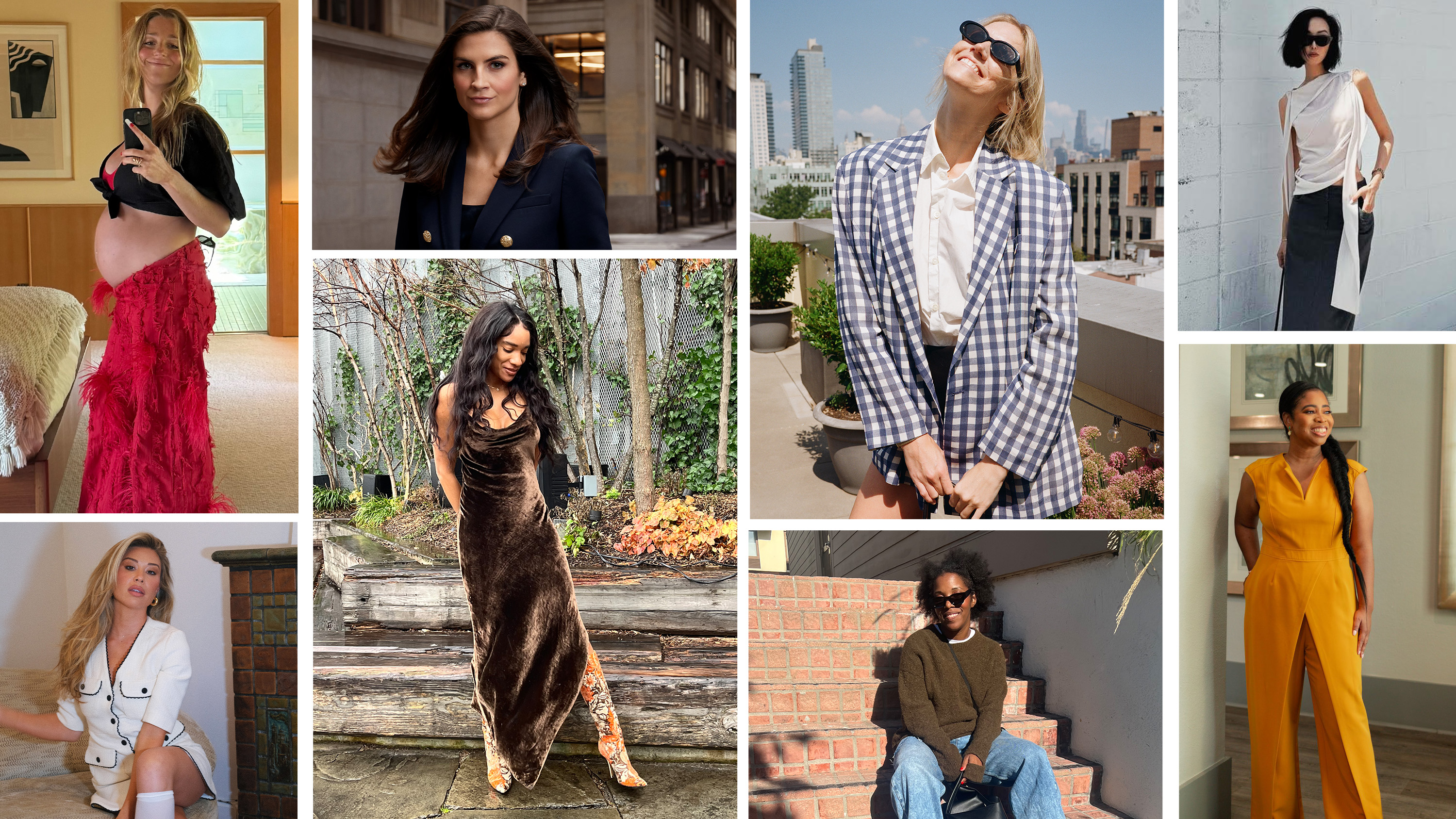

In your teens, your fashion choices were about fitting in with the cool kids at school, dabbling with self-expression, and pissing off your parents. In your 20s, you filled your closet with fun, low-stakes, and trendy pieces (i.e., fast fashion) that changed with your moods and the seasons. Now that you're in your 30s, you've invested in your Grown Woman essentials—the perfect little black dresses, office-appropriate pumps, and designer handbags that signal to the world, "I am a fully realized adult with a wardrobe to match.” Or, at least, that’s the fashion pipe dream for the decade.
In reality, there's really no blueprint for dressing in your 30s. Life events, like pivoting careers and having babies, can reshuffle your style priorities (when you’re caring for a three-month-old, a $3,000 luxury bag is, admittedly, not a practical diaper bag). With remote work and evolving definitions of professional attire, your ideal work outfit might be less ‘pencil skirt and stilettos’ and more ‘elastic waistbands and house slippers.’ Maybe you’ve discovered an entirely new version of yourself during the decade, making any preconceived plans of who you’d be and what you’d wear at 30 moot.
In short, personal style is exactly that—personal. And your 30s are just another chapter of self-discovery. Which is why we spoke to eight different women in their 30s about fashion, life, and how each informs the other. Here, they discuss their worthwhile splurges, dressing an ever-changing body, and how the best way to find your style is to find out who you are first and allow that definition to remain fluid and free.
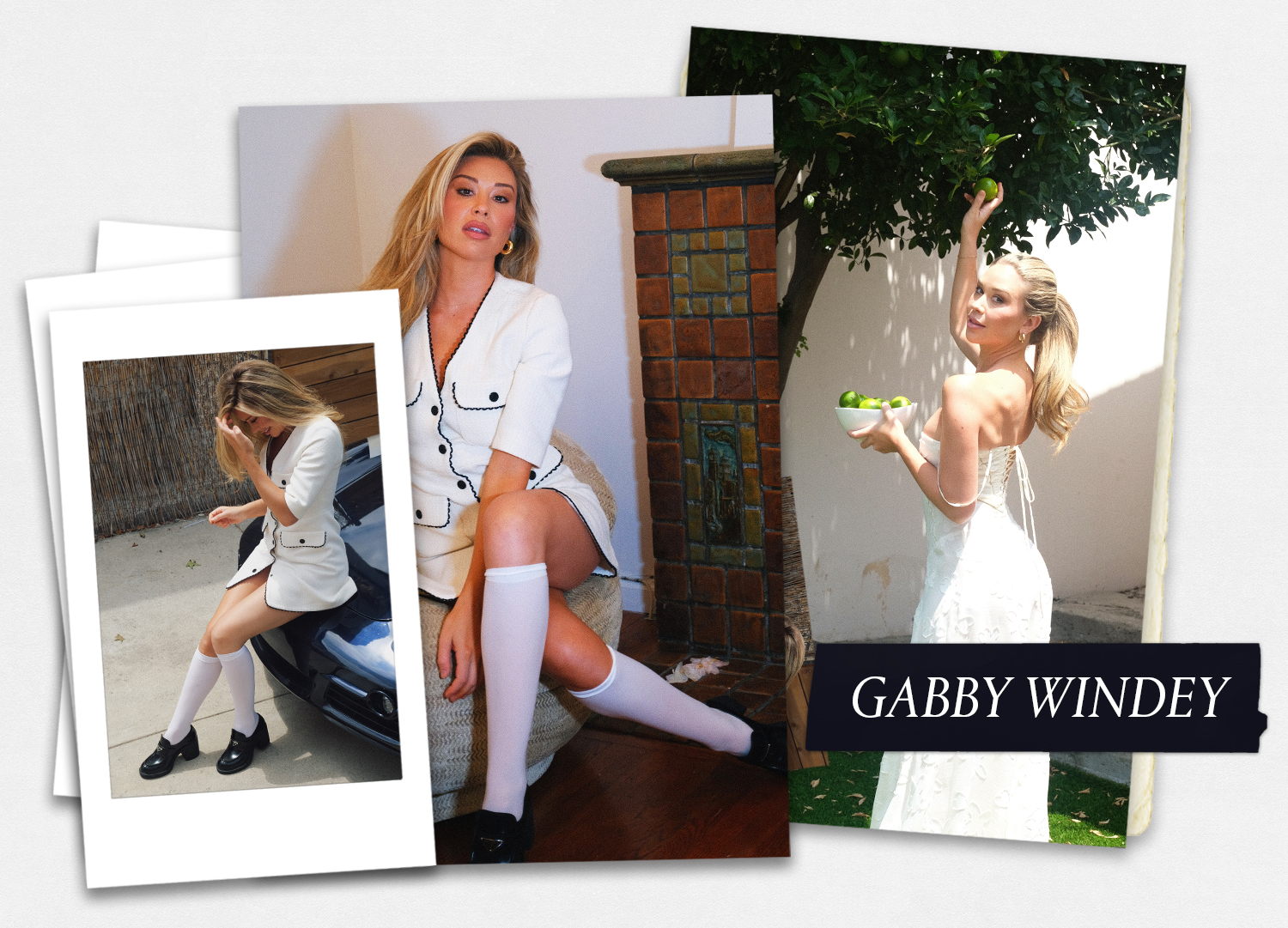
By not dating men anymore, I feel like I can be much more liberated with my fashion. Now, I wear whatever the f–k I want.
Gabby Windey, 33, former ‘The Bachelorette’ co-lead
How coming out expanded her style perspective: You're already breaking out of this heteronormative box, quote-unquote, and with that comes a lot of other freedom in the other choices you make in life. By not dating men anymore, I feel like I can be much more liberated with my fashion. I can be a little more alternative and funky. I’m wearing things that I wouldn't have before [coming out]. My style is very feminine and pretty, but I'm playing more with baggy jeans and trousers and I find myself reaching for more pants. Now, I wear whatever the fuck I want.

Gabby Windey in an outfit emblematic of her fun, flirty, and '90s-inspired style.
Overall, [coming out] helped me realize that I'm a dynamic person and can have many different versions of myself instead of just one. It's fun to wear a more sophisticated Sofia Richie, rich-girl look one day but then be, like, a 90s-era, butt-crack-hanging-out slut the next. Basically, I recommend everyone becomes a lesbian—you'll have way more fun shopping.
On financial growth affecting her wardrobe: The biggest difference between my style when I was younger versus now is that I'm not broke as a joke anymore. Since being on The Bachelor and making more money, my style has evolved. In my teens and 20s, I was just so basic, wearing fast fashion and what everybody else wore. Now, I value not dressing like everybody else. I'm doing a lot of vintage shopping and treasure hunting for pieces that make me feel good. I'm investing more in quality clothing and spending my money not in the way of what everyone else is wearing but in what feels true to me.
A zero-regrets splurge purchase: Last year, my coming-out gift to myself was a pair of Prada loafers. If I'm going to spend money, it'll be on shoes because you get so much good use out of them—and these are a lifetime shoe. They’re comfortable, timeless, and go with everything. Whenever I wear them, it's a reminder of what I've done for myself, and it’s always a celebration.
Get exclusive access to fashion and beauty trends, hot-off-the-press celebrity news, and more.
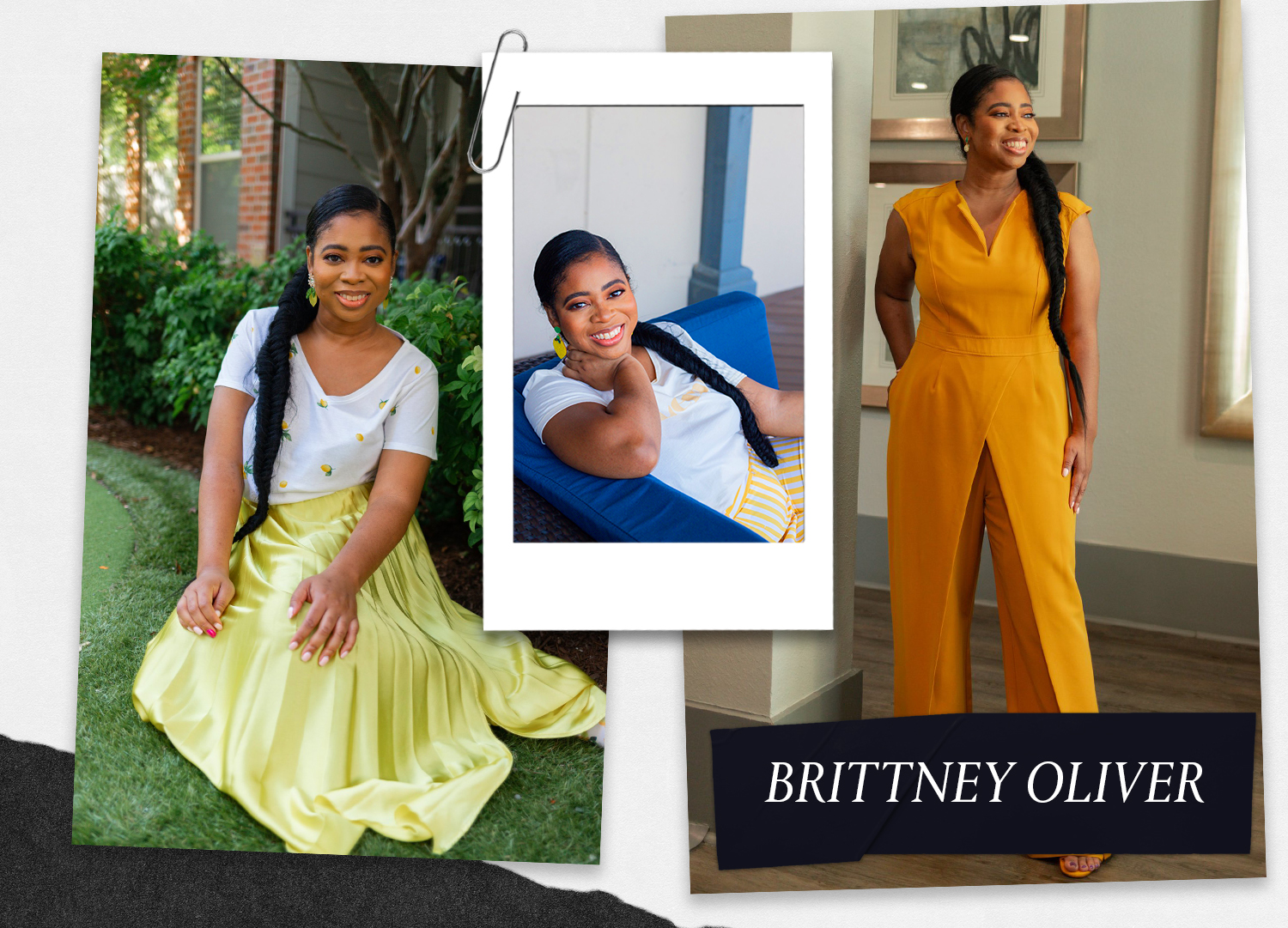
Right now, I’m wearing what’s best for my body and makes me feel comfortable. I’m proud of that.
Brittney Oliver, 35, founder of networking organization Lemons2Lemonade and content marketer,
The state of her style: Right now, I function in two worlds and two fashion extremes. I work remotely, so I wear loungewear and sweatpants when I'm home. But when I go out, I dress up and try to make a statement. I like to wear bold colors, like oranges, yellows, blues.
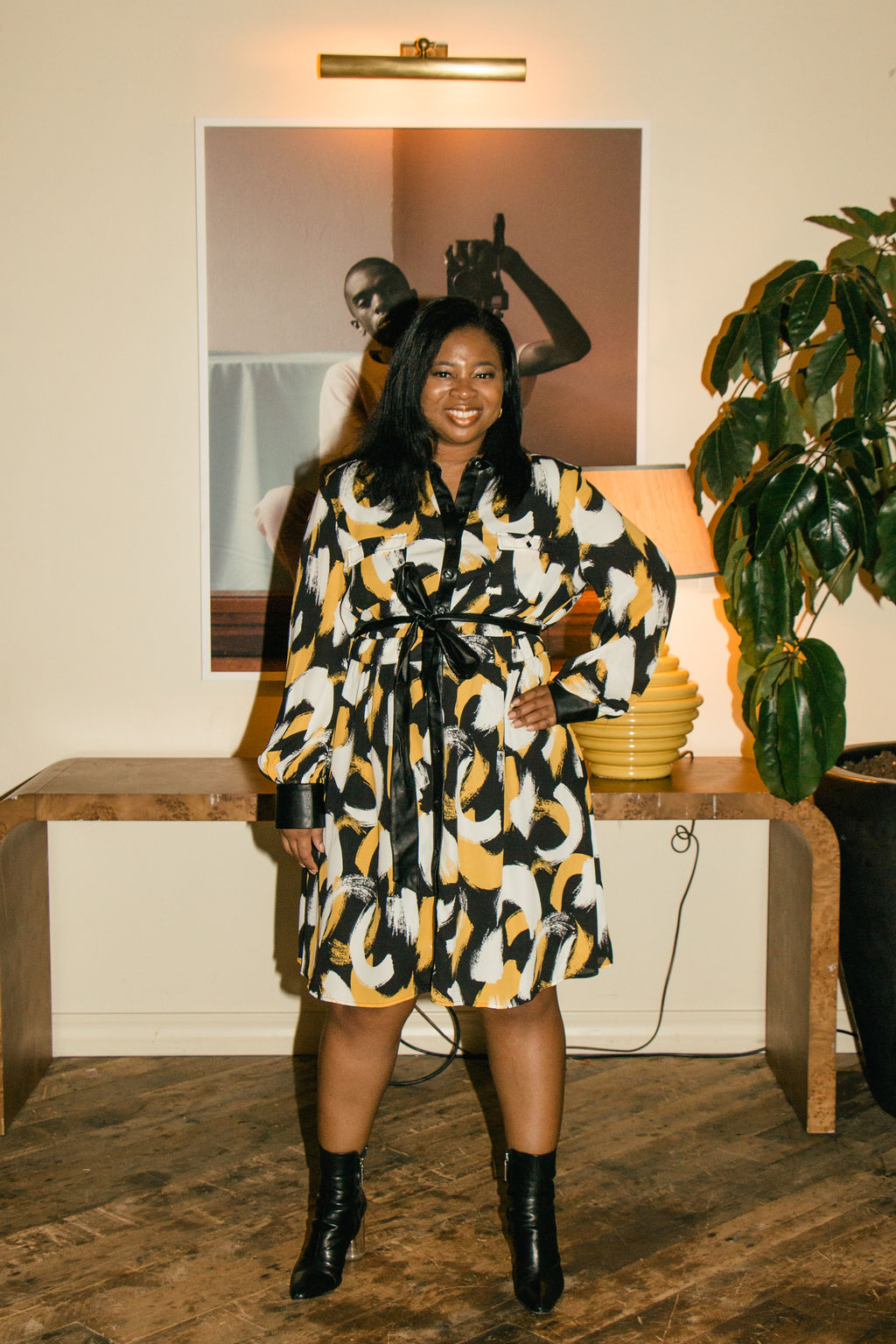
Brittney Oliver in a printed dress featuring her favorite color, yellow.
Navigating getting dressed through bodily changes: In May 2022, I had one surgery to take out a benign tumor—a paraganglioma—and about 17 uterine fibroids. I went through a terrible recovery. I had a hard time eating and didn't have an appetite, which caused me to lose a lot of weight. I was wearing clothes from college that I hadn't been able to fit into in years. A year later, my mom passed away, and the weight came back. Grief is a beast. I recently got a trainer, though, so my body's changing again as I'm strengthening and conditioning. Now, the clothes that fit me at my grief weight are too big and don't fit the same.
It's really frustrating to have to relearn how to dress my body again and again. Some days, I just don't have a lot of capacity, so clothes that make my life easier are great. I love a matching set; if the top and the pants go together, and I don't have to think too hard, I buy it.
Tuning out internal and external expectations: There's so much pressure to maintain how you look despite all the things you go through in your 30s. People get married, have babies, and their bodies change. People experience grief or medical health conditions, and these things affect your body.
But when you're scrolling on Instagram, you see images of women that look fantastic and healthy. It's overwhelming to maintain how you look when you’re dealing with obstacles that affect your health and wellness. I’m trying not to put too much pressure on myself if what I’m wearing isn’t a designer label or if it's not expensive. I have to remind myself that I'm doing the best I can. Which means, right now, I’m wearing what’s best for my body and makes me feel comfortable. I'm proud of that.
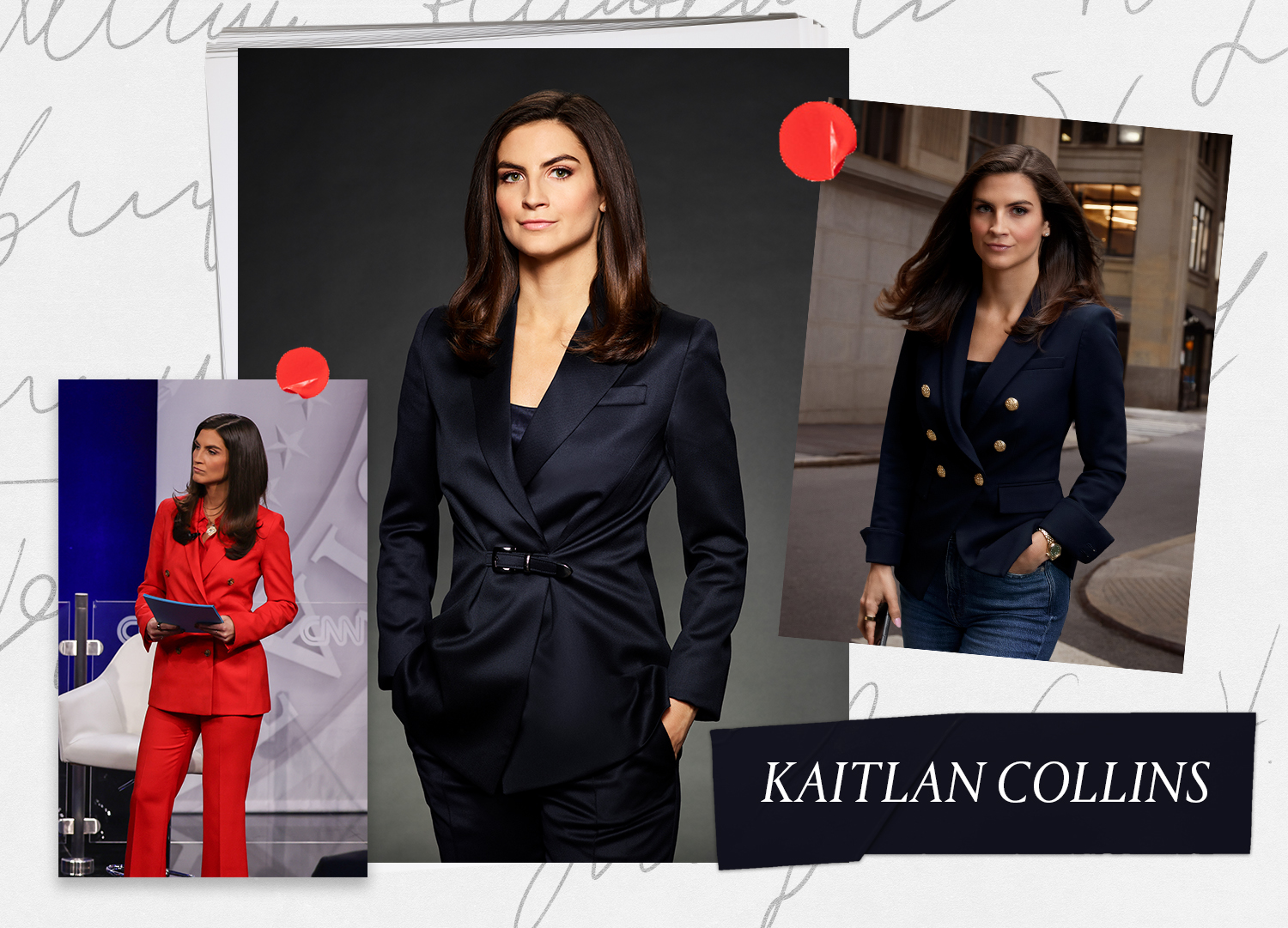
An outfit should allow you to focus on what really matters and the work that you're doing. That’s power dressing.
Kaitlan Collins, 32, political journalist and host of CNN’s 'The Source'
Her style in three words: Professional, classic, and crisp.
Her power piece: A bright, fitted blazer. It’s casual and comfortable—and if I need to be on TV in 30 minutes, I can make it happen. I pack one even when I go on vacation.
On her fashion philosophy: I’m very intentional with how I dress because I don’t want to be preoccupied with [my clothes] throughout the day. I established this when I was covering the White House as a reporter: I was inside the White House and then running outside to be on camera about 10 times a day. I needed an outfit that I didn’t have to think about during the day—something I was totally comfortable and confident in but never had to stop and adjust.
An outfit should allow you to focus on what really matters and the work that you're doing. In that sense, [fashion] is like a supporting character to you and your job. To me, that’s power dressing.
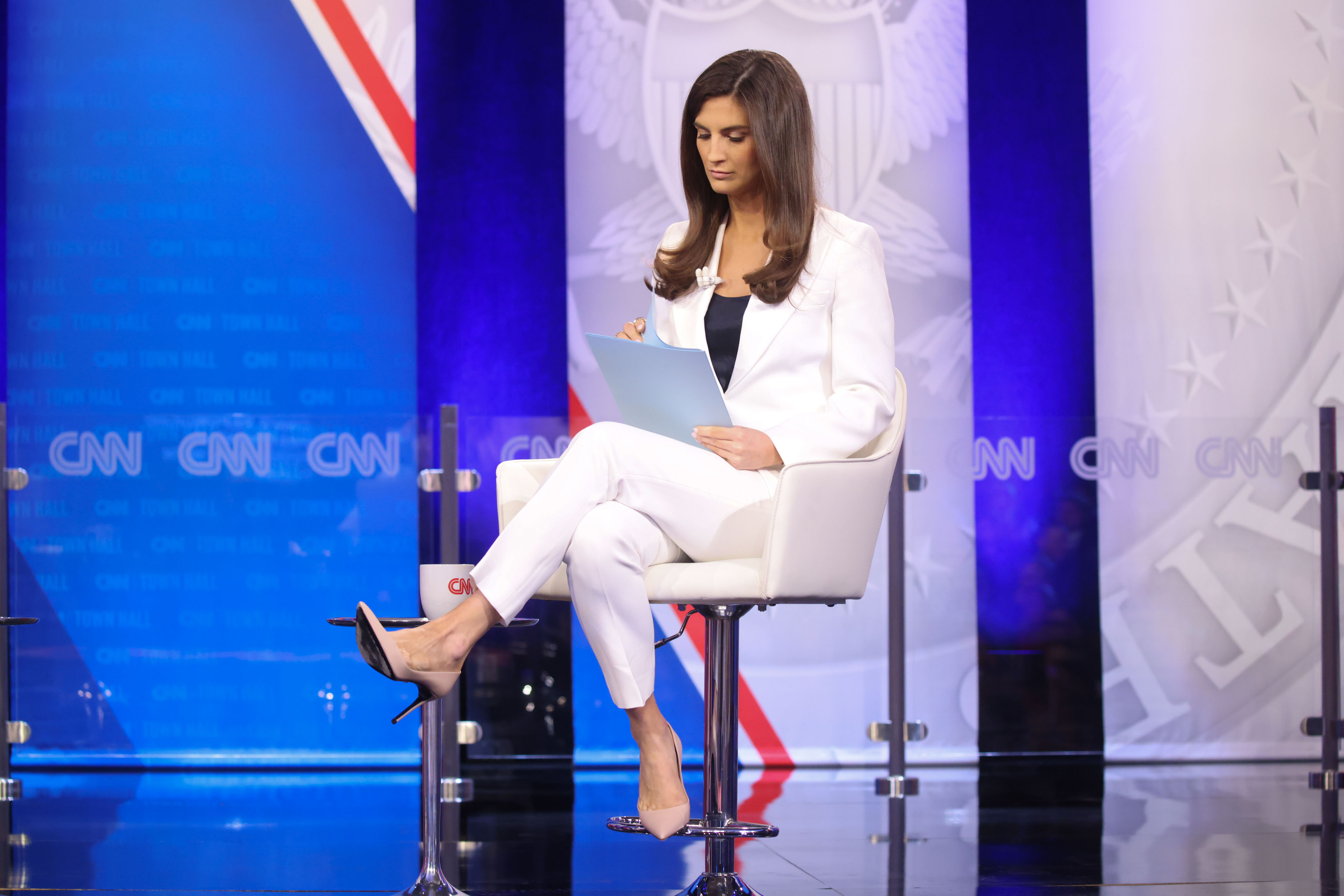
Kaitlan Collins in a white Michael Kors suit moderating the 2023 CNN Republican Presidential Town Hall.
Breaking down one outfit’s thought process: I picked a white Michael Kors pantsuit to wear when I moderated the 2023 CNN Republican Presidential Town Hall with Donald Trump. The pantsuit has always been a sign of female strength, and I was trying to dress for the moment. Because that was a big moment—it was Donald Trump's first time back on the national stage in a way we had not seen him since he left office—and that suit underscored its importance. And the suit worked in the sense that it was something I could put on and not have to think about ever again. When I was on stage that night, I was focused on my questions rather than what I was wearing.
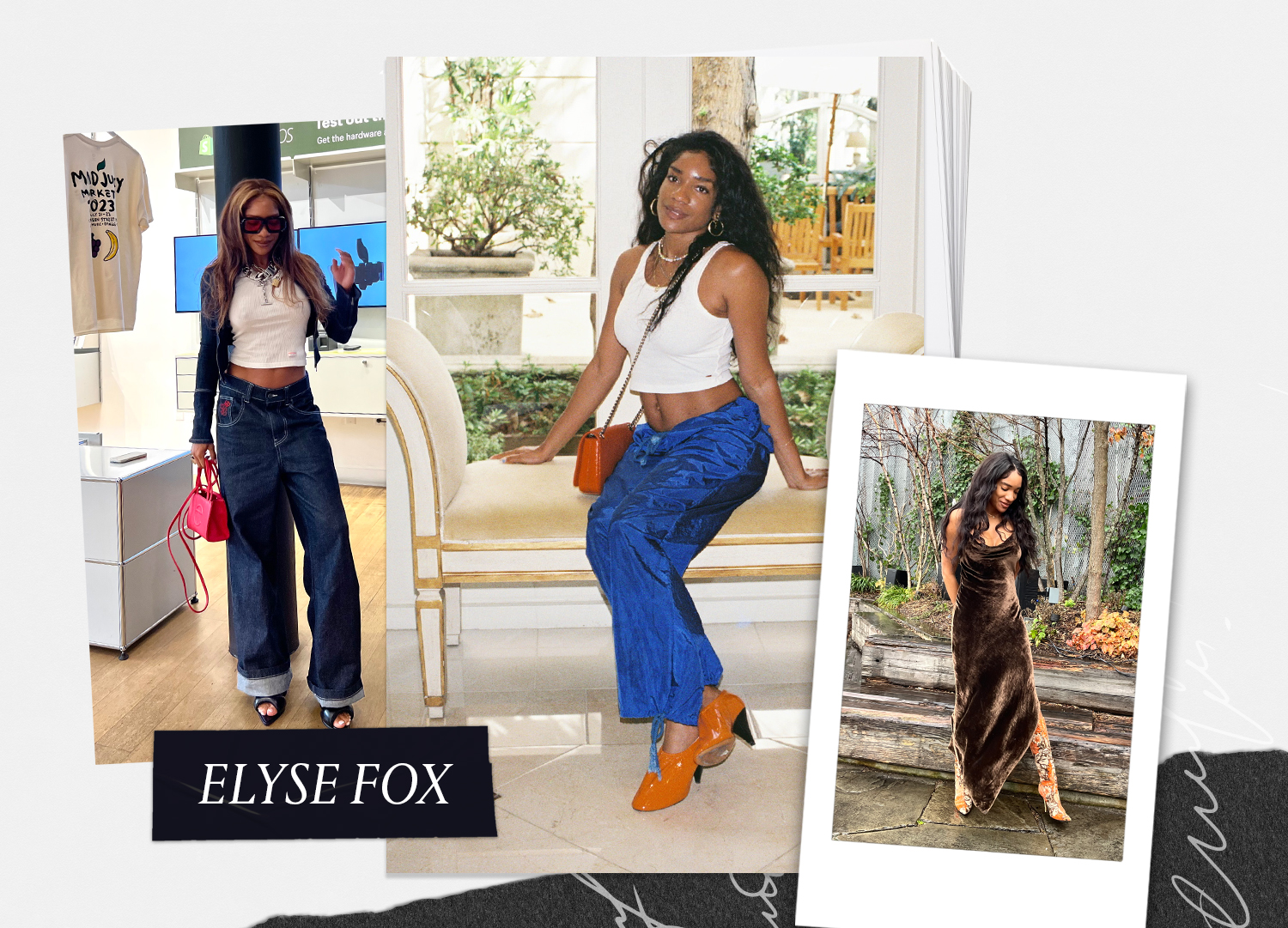
When I'm feeling my worst, I know one thing that will cheer me up is getting out of bed and putting on a fly 'fit.
Elyse Fox, 34, writer, mental health advocate, and designer
On letting go of sophistication as an end goal: I grew up watching the show Girlfriends, and [the characters] were in their late twenties and early 30s. Watching them, I was like, 'Oh my gosh, as soon as I turn 30, I have to be like them: Put together, not a hair out of place, matching accessories, et cetera.' But now I look at my 30s as my twenties, part two. I can still have fun, but I'm more settled into myself. I like wearing men's clothes and creating a juxtaposition between really baggy jeans and a more elegant or elevated top—I call it tomboy chic. I only dress in what feels right, which isn't always something elevated or put together, and that's fine. If an outfit doesn't reflect who you are, you're just wearing a costume every day.
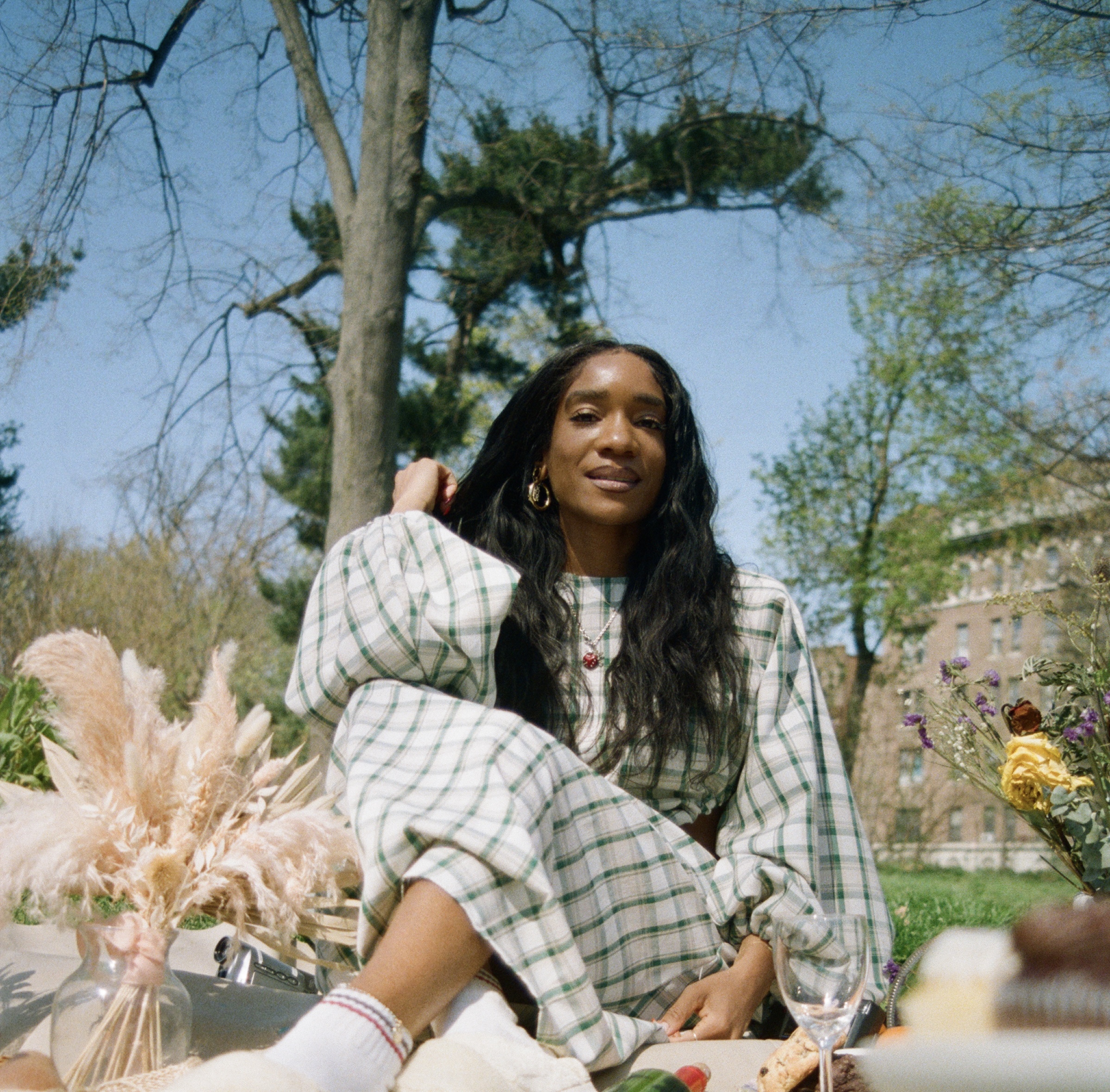
Elyse Fox in one of her many "fly 'fits."
Getting dressed as a mental health tool: The first thing I think about when getting dressed is my mood; if I'm feeling bad, I try to dress against that. Previously, when I was going through a depressive episode, I would look like it, honestly—which would make me feel worse and lean more into my depression. But now, when I'm feeling my worst, I know one thing that will cheer me up is getting out of bed and putting on a fly 'fit.
It's so corny but when you look your best, or the best you can at that moment, you do feel your best. It's one step towards that self-care process of getting you out of your head. To heal and pull yourself out of that rut, you have to think, ‘What do I want to look like, and how do I want the world to perceive me—even if I don't feel that way right now?’ And sometimes, I tell myself, ‘I'm already depressed, so what’s the worst thing that can happen? Let me just wear this funky dress and see if I feel good in it.’
[Fashion] is a great outlet for you to, one, feel better about yourself and, two, just get you out of bed.
Her default comfort clothing: I have a baggy, old New Order t-shirt with holes in it that I feel really good in. It reminds me, ‘You have worn this T-shirt during a depressive episode before, and it worked.’ It helps me perceive myself in a different way.I look in the mirror, and I'm like, ‘Whoa, your hair isn't brushed, but you have on a cool shirt that you look good in, feel comfortable in, and that is true to you.’
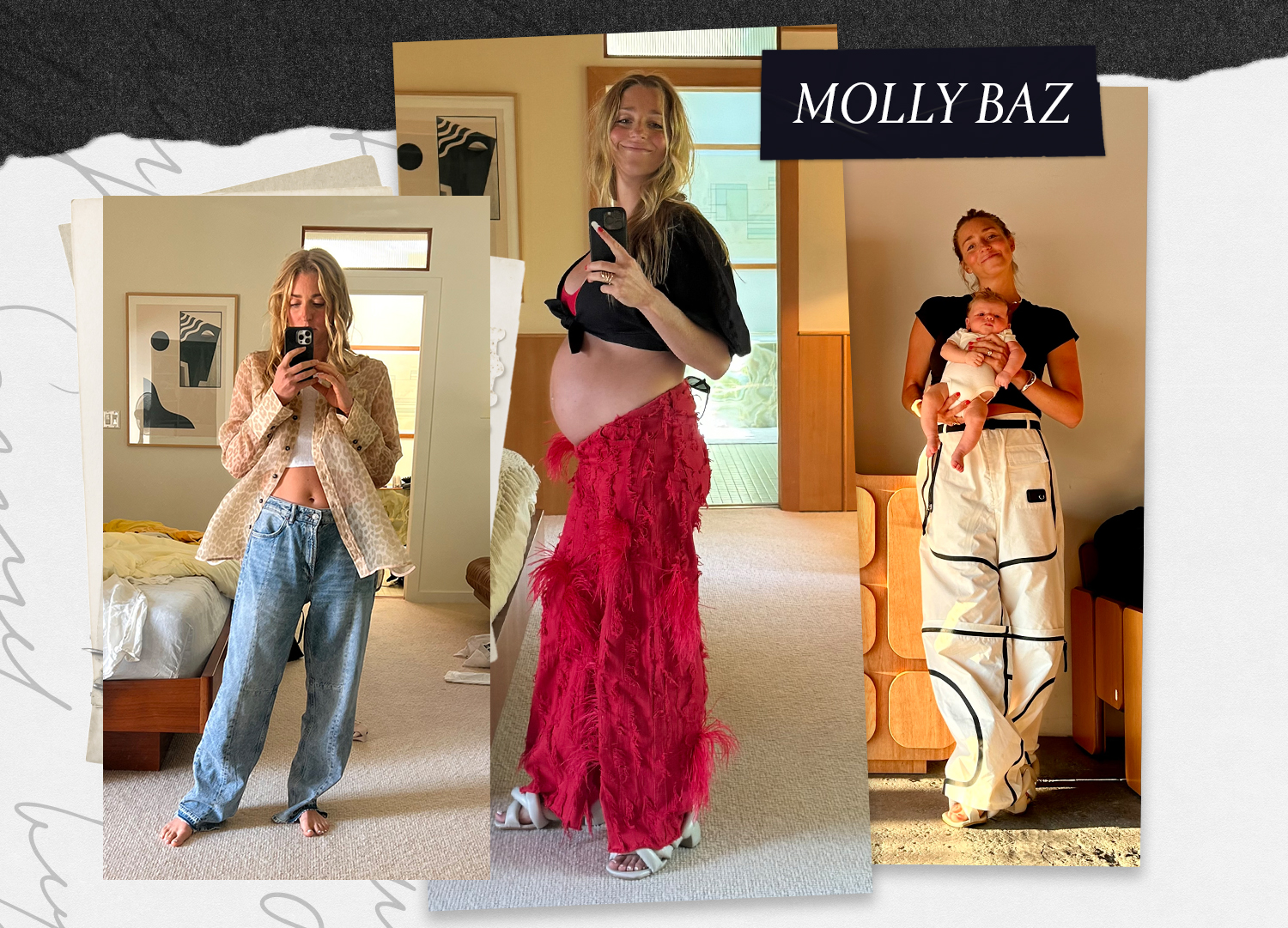
By no means do I feel like I must dress as a ‘mother’ now. Honestly, I feel more playful, lighthearted, youthful, and alive than ever before.
Molly Baz, 36, chef, bestselling cookbook author, and co-founder of Drink This Wine
A now-retired hero item: There was a period where I exclusively wore linen jumpsuits by the Brooklyn-based designer Ilana Kohn. She was a pioneer in the functional woman’s work-suit aesthetic moment, which, as a cook, was both appealing and convenient for me. At the height of my jumpsuit heyday (in my late twenties), I think I owned upwards of 40 jumpsuits. They were big, baggy, and unstructured, and I think I wore them in an effort to re-think what was considered an ‘appealing’ female silhouette.
My style still fluctuates quite a bit between girly, more androgynous, or even masculine. But my favorite outfits now are ones that play in all of those spaces at once—a really baggy oversized pant paired with a daintier heel and some kind of structured top that’s at once concealing and revealing.
The impact of pregnancy on her fashion: My pregnancy era has been my favorite style era to date. It was really liberating to have a new body shape to dress. I felt like I was able to challenge the idea of what a pregnant woman should look like, how she should dress, and what those style choices could stand for. Crop tops came back into the fold as a go-to style during pregnancy because I loved my big, growing belly and wanted to embrace it as much as I could.

Molly Baz pictured with her favorite photo partner, her son, Gio.
Now that I’m postpartum, I am entering a new phase. For starters, my tits are enormous, and while I used to conceal my boobs through my wardrobe choices (see: the jumpsuit era), I am now all about embracing them. I can’t get over how cool it is to all of a sudden have porn-star-sized boobs after 36 years of life. I’ve been wearing tighter, more form-fitting tops (including crop tops—you can take the girl out of the 2000s, but you can’t take the 2000s out of the girl) and reveling in an ever-evolving body once again.
On self-defining her motherhood era: By no means do I feel like I must dress as a ‘mother’ now that I have a baby. Honestly, I feel more playful, lighthearted, youthful, and alive than ever before. I just kind of don’t give an eff. Last week, I wore a pair of neon orange hot pants that brought me straight back to my American Apparel-obsessed college days over two decades ago. If you catch me on the street these days, I’ll probably have a crusty, spit-up stain on my shirt—but I’m just embracing that, too.
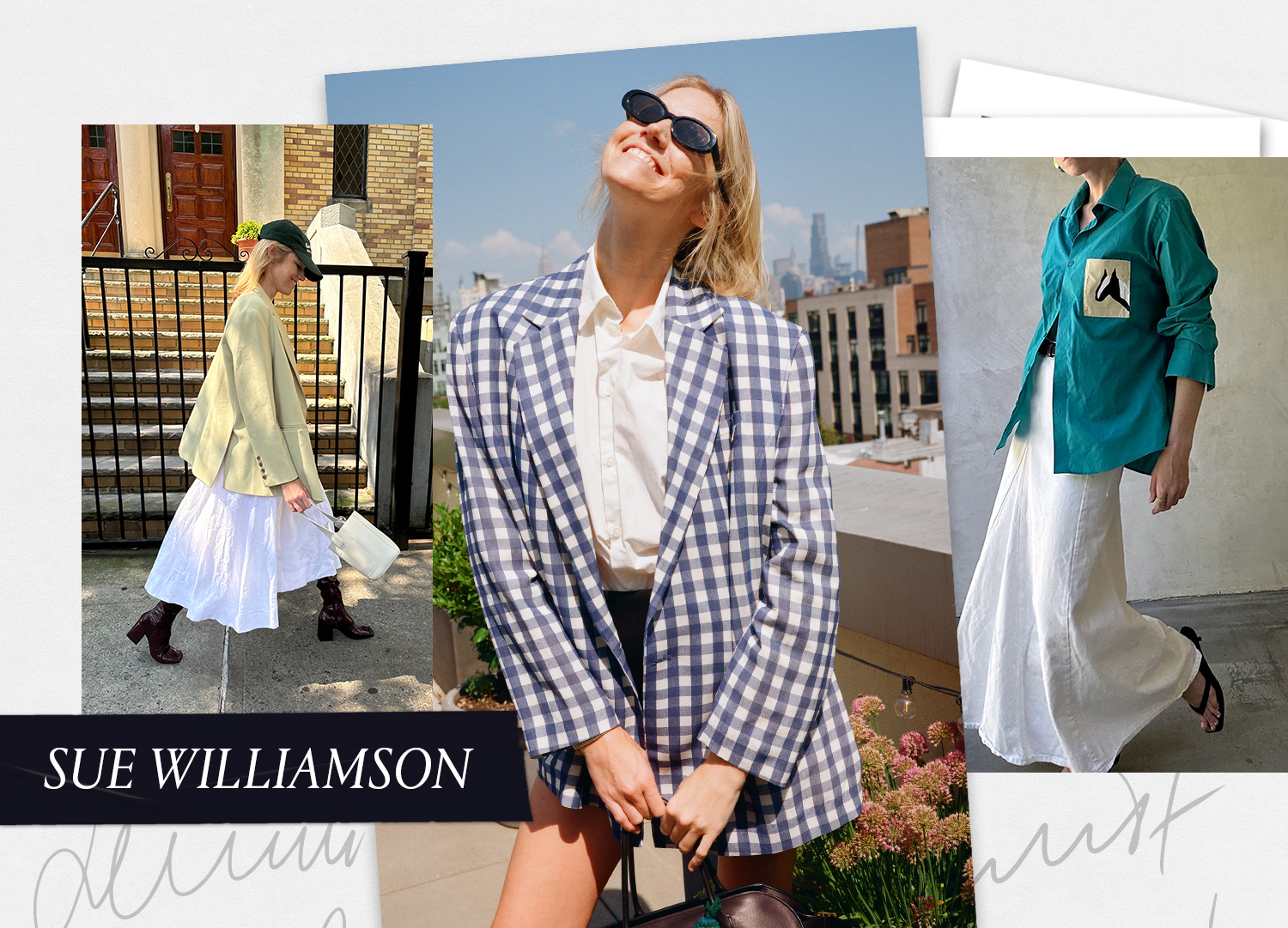
I still have fun with clothes, but I care way less about what people think about them.
Sue Williamson, 34, brand consultant, writer, and designer
Fashion reflections and predictions: When I was younger, I remember reading (or maybe I heard Michael Kors say it on Project Runway) this advice: Dress crazily in your teens and twenties because, after that, you're not going to be able to dress that way. I took that to heart and dressed like such a nut when I was younger. I was the intern at various fashion magazines in head-to-toe leopard—leopard tights, dresses, and shoes. I wasn't discerning with what I wore. Every day, I looked like I was coming out of a different costume party. I wanted to stand out, and clothes were a way to do that.
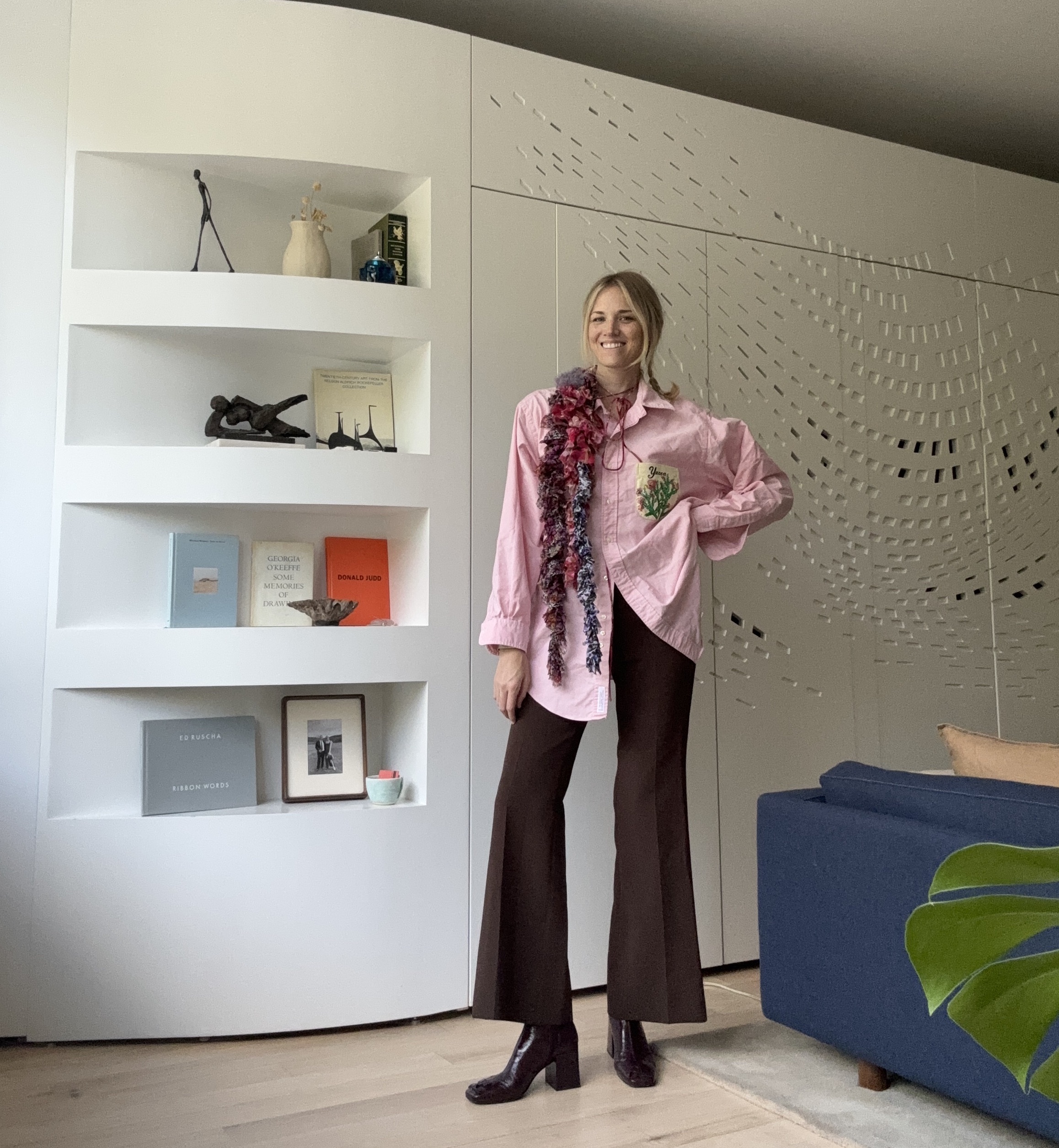
Sue Williamson, dressed as playfully as ever.
When I entered my 30s, I didn't feel like I had as much to prove. I feel so much more relaxed when getting dressed now. I'm a little more established and don't have to be screaming for attention anymore. I'm more thoughtful about where I'm going and what's appropriate for each occasion. I still have fun with clothes, but I care way less about what people think about them.
I’m looking forward to being a crazily dressed old lady, too, because I think that's when [personal style] swings back the other way. I'm going to be a white-haired lady wearing head-to-toe leopard.
A eureka fashion moment: I was diagnosed with breast cancer at 30, which changed the way I dress in many ways. On a practical level, it made comfort a much bigger priority. But on a fashion level, [the diagnosis] made me want to dress up a little more to celebrate each day. I let go of some of those style reservations you might have in your 30s and was like, ‘No, I really feel like wearing feathers or fringe to my treatment today.’ It reminded me that aging is a privilege, and you should always just wear the fun thing.
A through-and-through ‘Sue’ buy: I just bought some burgundy knee-high Courrèges boots that feel very Sue. I wear them with white linen dresses; you get this juxtaposition of sweet and classic, but then it looks like these lizard legs are coming out of the bottom of the dress. I feel so myself in that [outfit]—it’s classic and a little modest, but then there’s this wicked twist with the boots that puts a pep in my step.
Those [boots] helped me come back to myself. Even though my hair is growing back and I have been declared NED [no evidence of disease], I haven't always felt like myself going through [cancer treatment]. But when I put those Courrèges boots on, I was like, ‘Oh my god, I feel like old Sue again.’
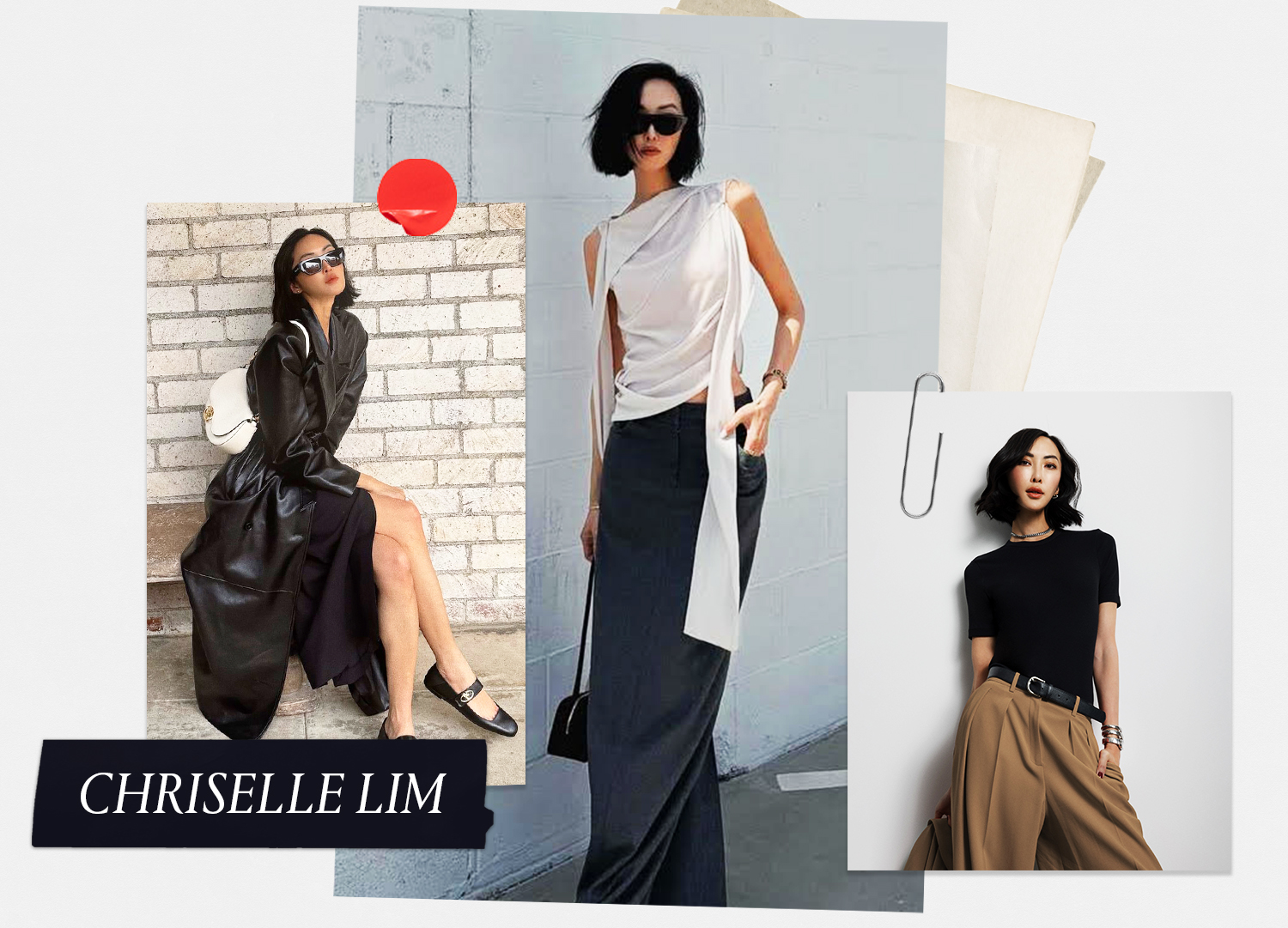
Buying myself something special is a gift to celebrate choosing me and having the courage to start over.
Chriselle Lim, 39, fashion content creator and founder of fragrance brand Phlur
On allowing fashion to be fluid: I don’t buy into the idea of having to define your style. As I’ve gotten older, I’ve learned I don’t have to put myself in a bucket for a certain way of dressing. Life is constantly changing, and I am ever-evolving, so naturally, my style is, too. Some days, I’ll wear things that are more sexy; some days, I’ll wear things that make me feel like a boss; and other days, I’ll wear more casual clothes. Sometimes I get inspiration from my 10-year-old daughter, and sometimes I'm inspired by a 60-year-old woman.
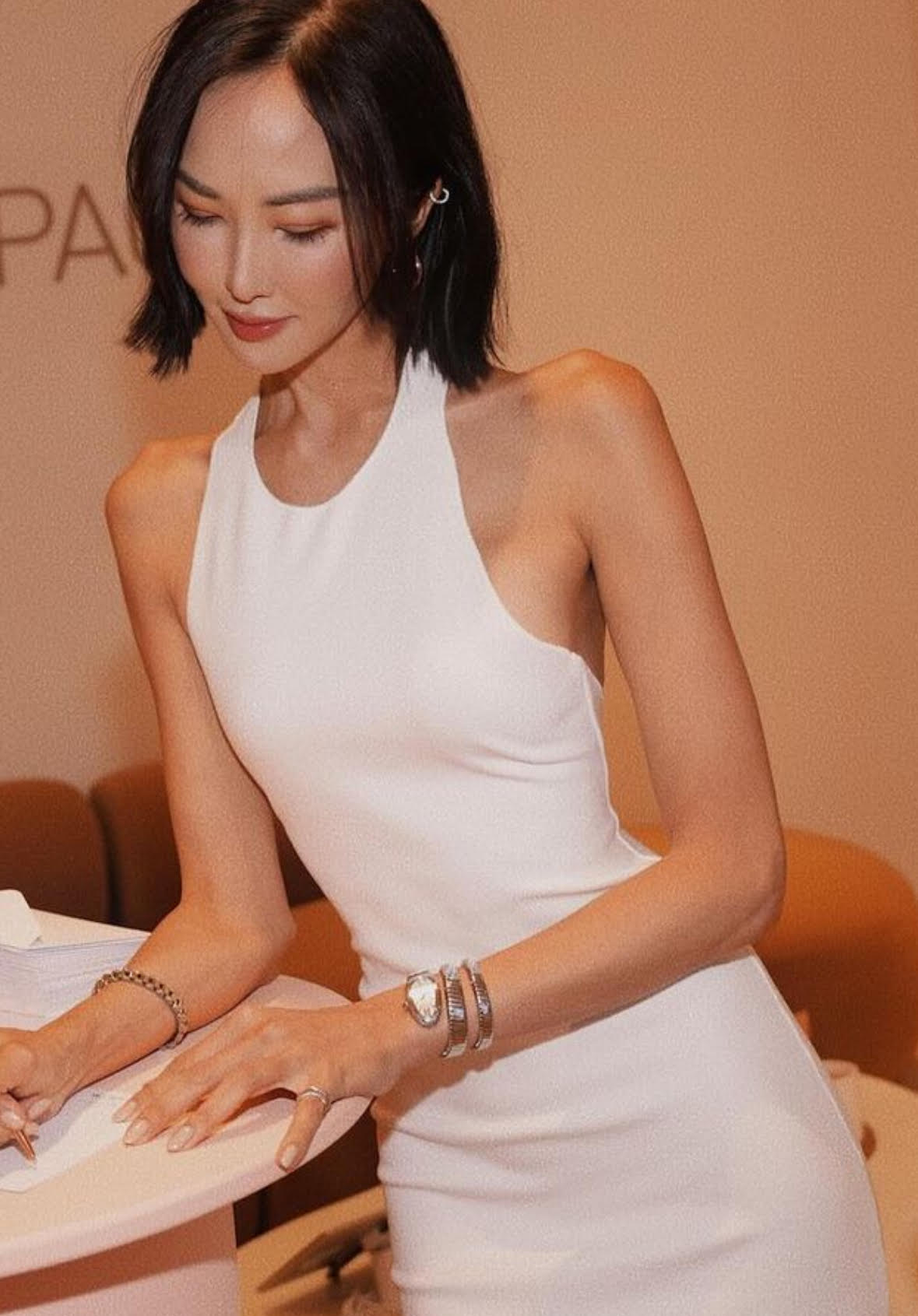
Chriselle Lim wearing her prized Bulgari Serpenti watch.
A symbolic purchase: Every year on my birthday, I treat myself to something I’ve been eyeing for a while—with no guilt. This year, it was a Bulgari Serpenti watch, and I’ve worn it almost every day since I got it.
The tradition of treating myself started on my birthday four years ago. I was in a deep, dark place and realized I needed to walk away from a toxic relationship that no longer served me. That day, I decided that I was no longer going to live my life for everyone else, and I was not going to feel guilty about putting myself first. Now, my birthday has become more of an independence day. Buying myself something special is a gift to celebrate choosing me and having the courage to start over.
Style advice she wishes she had heard earlier: No amount of money, designer things, and brand logos will make you cool. What makes you cool is how you take pieces and make them your own.
Style advice she wants to impart to young women: I have an 80/20 rule that I live by: 80 percent of the time, invest and put your money into the things you know that work and will last you a long time—the classics that will never go out of style. But 20 percent of the time, have fun and take those risks! Try out trends—sometimes they work, and sometimes they don’t. Most times, you will love them at the moment and hate them by the next season. But you should at least try them.
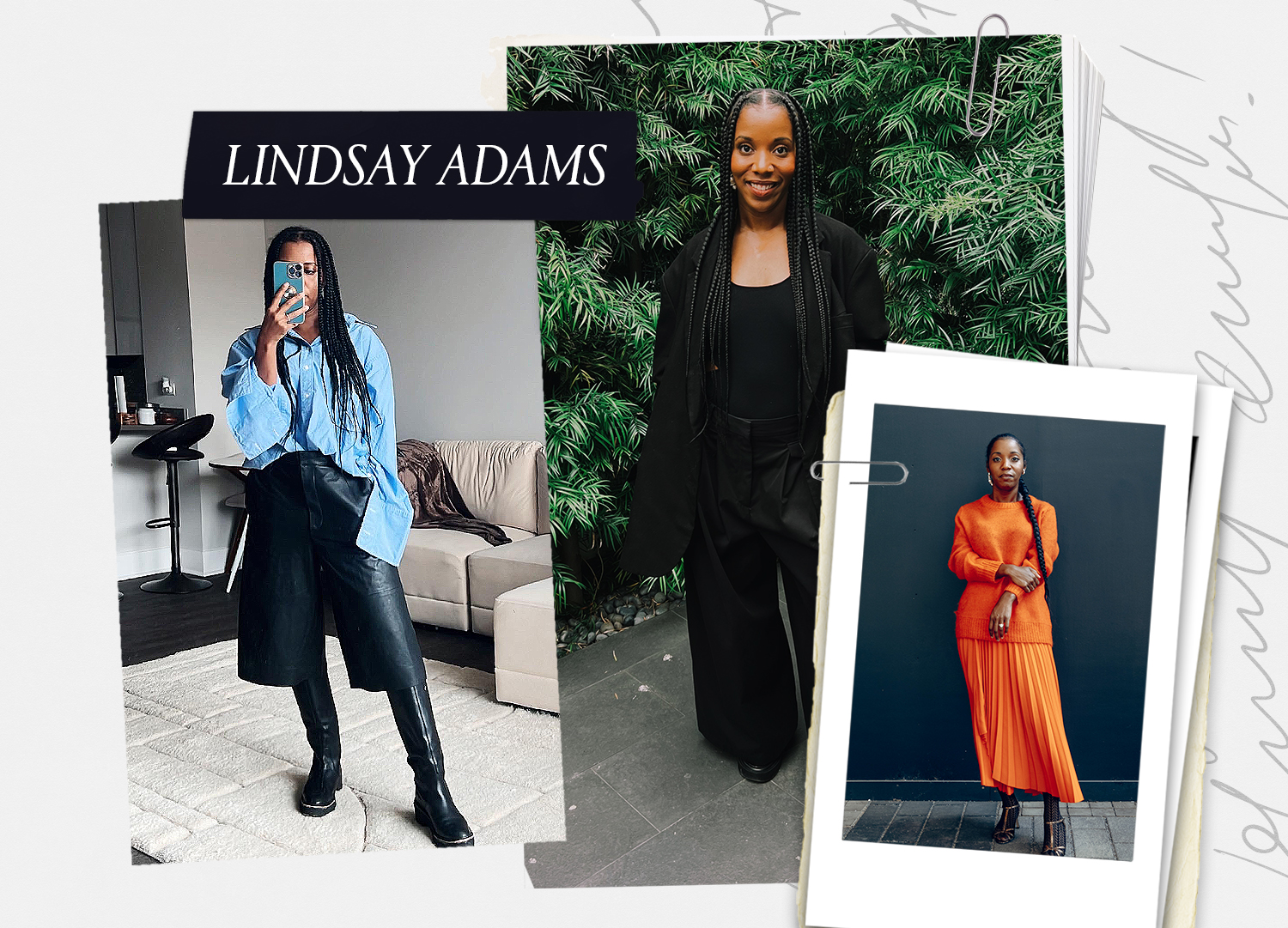
Similar to when you fall and have to get back up in life, I look at my fashion that way, too.
Lindsay Adams, 33, artist
Her fashion philosophy: When I'm getting dressed, I think about how I can be functional and comfortable but absolutely never boring. Amy Smilovic [the creative director of the fashion brand Tibi] calls it creative pragmatism. I ask myself: “How long am I going to be out of the house? Is this outfit made for day to night?" I want something comfortable that I can move in because I don't want to feel any aches about what I'm wearing. But I always—always—make sure my outfit has some funk.
On honing her style over time: My fashion has always been more on the preppy side. I went to an all-girls private school, so I wore a lot of polos, plaid blazers, and Lily Pulitzer. In my twenties, I worked in the corporate space as a management consultant and wanted to have a sense of stylistic sophistication. I remember thinking, “Who do I want to be? How do I want to present?” I wanted to look well-dressed and still feel creative, but I didn’t really know what that looked like.

Lindsay Adams, in an evolved preppy look, in front of a Joan Mitchell painting at The Louis Vuitton Foundation in Paris, France.
Only when I went into the art space full-time did I feel that those rules—of what you have to wear to ‘present professionally’—didn’t apply to me anymore. My style still has this preppy aesthetic to it, but it doesn't feel too uptight. My quintessential outfit is just an evolution of what I've always worn: a nice structured pant and an oversized blazer with either a nice tee or bodysuit that shows some skin. Classic but also creative—that’s Lindsay.
On enjoying her fashion mistakes: Now that I’m in my 30s, I have a lot more clarity [about who I am]—which I think is synonymous with hitting this decade. I’m at this point of womanhood where I’m like, ‘It’s okay to make mistakes. I don’t expect to be perfect all the time, even though I would love to be.’
I'm willing to try something different and push my style a little further. If I don't like something I’m wearing, I don't have angst about it. If I have an idea in my mind of what I want an outfit to look like and it doesn't work out, I can just pivot and figure it out. Similar to when you fall and have to get back up in life, I look at my fashion that way, too.
Read more stories in honor of Marie Claire's 30th anniversary here.
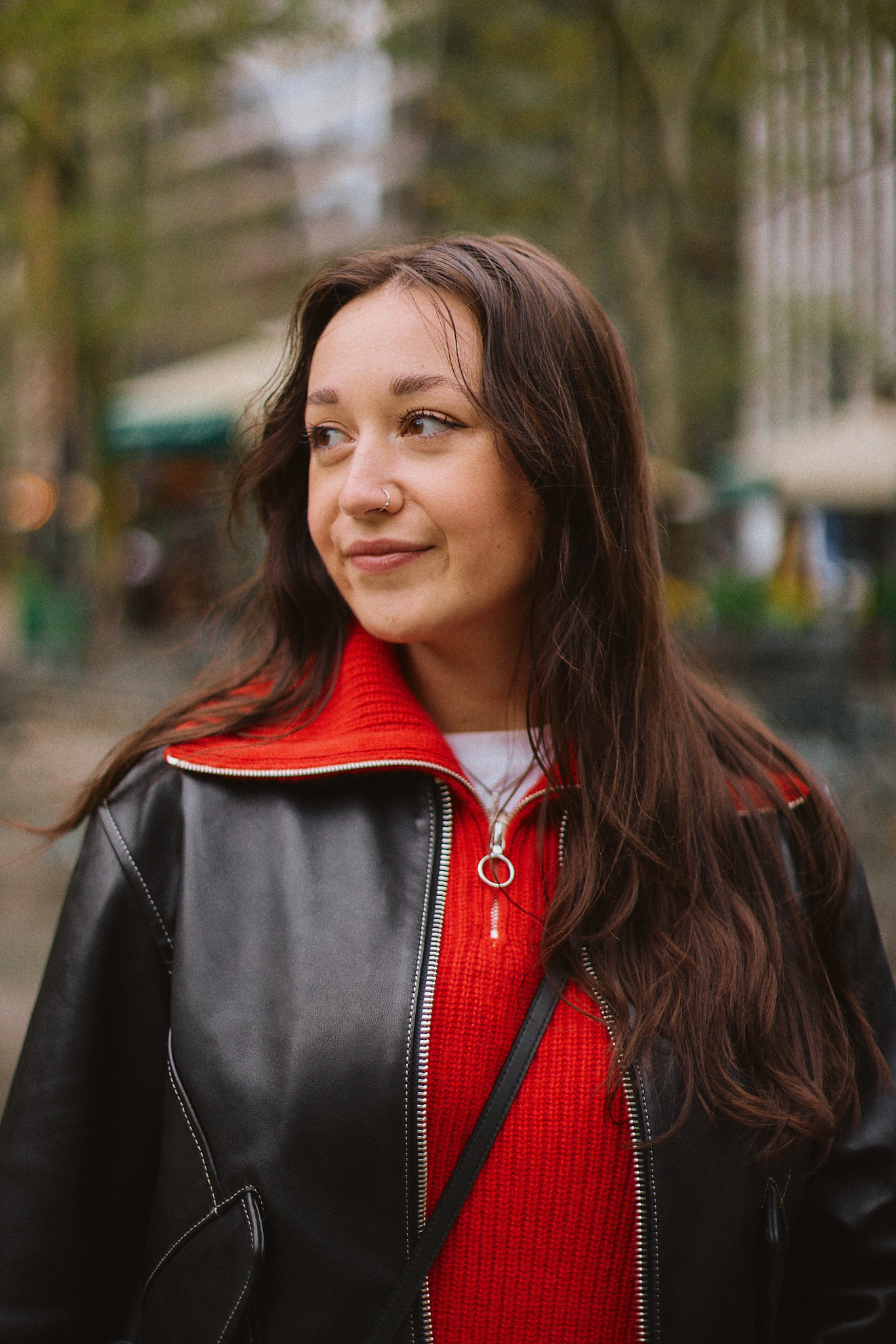
Emma Childs is the fashion features editor at Marie Claire, where she explores the intersection of style and human interest storytelling. She covers viral, zeitgeist-y moments—like TikTok's "Olsen Tuck" and Substack's "Shirt Sandwiches"—and has written hundreds of runway-researched trend reports. Above all, Emma enjoys connecting with real people about style, from picking a designer's brain to speaking with athlete stylists, politicians, and C-suite executives.
Emma previously wrote for The Zoe Report, Editorialist, Elite Daily, and Bustle and studied Fashion Studies and New Media at Fordham University Lincoln Center. When Emma isn't writing about niche fashion discourse on the internet, you'll find her stalking eBay for designer vintage, doing hot yoga, and "psspsspssp"-ing at bodega cats.